Iran Will Circumvent Upcoming Sanctions, Says IRGC-Affiliated Media
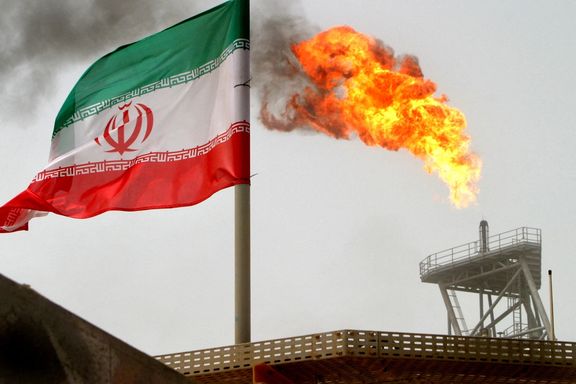
In response to impending US and EU sanctions against Tehran, Tasnim, a news outlet affiliated with the IRGC, asserted that Iran will continue to evade the sanctions.

In response to impending US and EU sanctions against Tehran, Tasnim, a news outlet affiliated with the IRGC, asserted that Iran will continue to evade the sanctions.
Following Tehran's attack on Israel over the weekend, sanctions against Iran are expected to be imposed in the coming days.
In a report titled "New sanctions, fake or real?" published on Wednesday, Tasnim stated that the new sanctions on Iran would be ineffective.
"The severity of the sanctions imposed over the years, especially in the last decade, has been at its highest level, and the Iranian economy has learned resilience and methods of circumventing these sanctions well," Tasnim’s report read.
Tasnim itself was sanctioned last year by the US, in connection “with the Iranian regime’s violent suppression of nationwide protests following the death of Mahsa ‘Zhina’ Amini.”
In a response to Iran’s attack, the US House of Representatives passed legislation aimed at countering China’s purchase of Iranian crude oil as part of a package of bills being brought to the floor.
Tasnim’s report claims that the demand for Iranian oil from major manufacturing countries like China acts as a constraint on Washington's ability to enforce new oil sanctions against Iran.
In the past months, Iran has heavily relied on exporting millions of barrels from floating storage to boost its oil exports to Beijing.
Earlier this week, US Treasury Secretary Janet Yellen addressed Iran's ongoing oil exports despite US sanctions, stating that "...there may be more that [the US] can do".
The head of the Iran-Iraq Chamber of Commerce, Yahya Ale Eshaq, told Tasnim that the talk of increased sanctions is more of a psychological game and that given the risk of higher oil prices, "the Americans will not have much power" to impose sanctions.
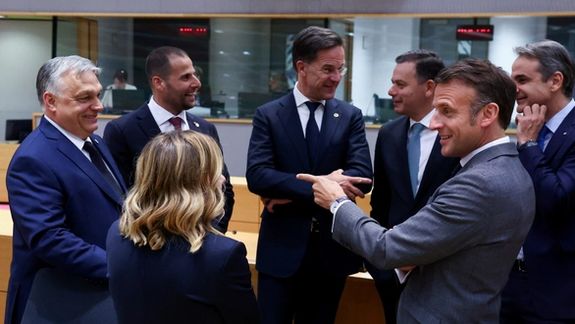
European Union leaders decided on Wednesday to step up sanctions against Iran after Tehran's recent attack on Israel left world powers scrambling to prevent a wider conflict in the Middle East.
The two-day summit in Brussels is the first meeting of the EU's 27 national leaders since Saturday's attack, more than six months into the war between Israel and the Iran-backed Palestinian militant group Hamas.
Israel has signaled that it will retaliate but has not said how. The EU has urged Israel to exercise restraint while expressing readiness to tighten sanctions on Tehran.
"We have to adjust, to expand them (the sanctions) on Iran," French President Emmanuel Macron said in Brussels ahead of the summit.
"We are in favor of sanctions that can also target all those who help manufacture drones and missiles that were used in the attacks last Saturday and Sunday."
In the coming days, the US will also impose sanctions on Iran's missile and drone programs, as well as on entities that support the Islamic Revolutionary Guard Corps (IRGC), and the Defense Ministry, according to Jake Sullivan, the National Security Adviser at the White House.
German Chancellor Olaf Scholz said it was important that Israel "does not respond with a massive attack of its own".
The leaders will condemn the Iranian attack, reaffirm their commitment to Israel's security and call on all sides to prevent more tensions, including in Lebanon, according to a draft statement seen by Reuters.
"The EU is ready to take further restrictive measures against Iran, notably in relation to unmanned aerial vehicles (UAVs) and missiles," said the statement.
Italy spoke separately ahead of G7 talks in favor of sanctions against those who supplied arms for the attack against Israel, as well as those behind attacks on ships in the Red Sea.
Iran launched the attack on Saturday in response to an April 1 strike on a building adjacent to its embassy in Damascus which it blamed on Israel. Two IRGC generals and five senior officers meeting in the building were killed. Tel Aviv launched its military offensive in Gaza after Hamas' deadly attack on Israel on October 7.
EU Divisions
The war in Gaza has exposed differences between EU countries, with some siding more with Israel and others more strongly criticizing its conduct while highlighting the dire humanitarian situation in the Palestinian enclave.
Several EU states have proposed expanding a sanctions scheme that seeks to curb the supply of Iranian drones to Russia for Moscow's war in Ukraine to include the provision of missiles and cover deliveries to Iranian proxies in the Middle East.
Belgian Prime Minister Alexander De Croo backed introducing sanctions against Iran's Revolutionary Guard Corps but Scholz said that required further legal checks.
On Tuesday, EU's top diplomat said the bloc's rules meant that could only happen if a national authority in the EU found that the group had been involved in terrorist activity.
Based on political decisions at the summit, EU foreign ministers are due to continue the sanctions work next Monday.
The United States and other Western governments hope new sanctions against Iran will help persuade Israel to limit its retaliation. Analysts say, however, Iran is unlikely to face severe punishment because of worries about boosting oil prices in a US election year.
With reporting by Reuters
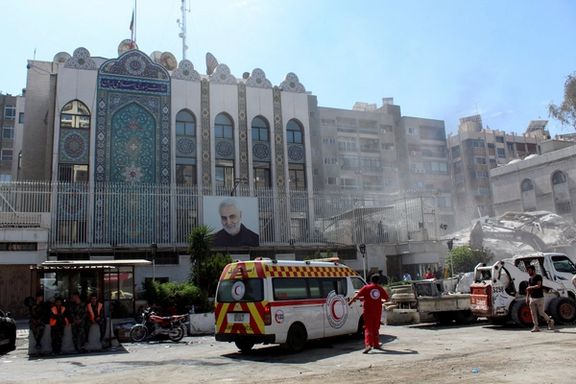
After Iran's missile and drone attack aimed at Israel over the weekend, the country is bracing for possible retaliatory attacks either on its territories or proxies.
This comes after the Iranian government had made preparations to safeguard their assets, which included activating the air force for possible strikes, and deployment of navy escorts for commercial Iranian ships in the Red Sea.
In addition, the Wall Street Journal reports that they are in the process of evacuation at Iranian bases within Syria, especially where the Islamic Revolutionary Guard Corps (IRGC) predominantly resides.
After launching more than 350 drones and missiles, officials in Israel warned of a counter strike without specifying what kind of response is to be expected.
The US, along with European nations, has urged Israel to refrain from retaliation that could escalate tensions further.
German Foreign Minister Annalena Baerbock and Britain’s former Prime Minister David Cameron had separate meetings Wednesday with Israeli Prime Minister Benjamin Netanyahu, in which they echoed a message of de-escalation.
The Biden administration also plans to shore up the diplomatic effort with new economic sanctions on the IRGC and its economic links to Iran's missile and drone programs.
On the military front, it is reported that Iran ordered emergency protocols, especially in Syria, where the IRGC and Hezbollah have adjusted their presence and heightened security measures in anticipation of potential Israeli strikes.
Tehran also indicated that it would respond to any Israeli attack. “The smallest action against Iran’s interests will definitely be met with a severe, extensive and painful response against all its perpetrators,” Iranian President Ebrahim Raisi said.
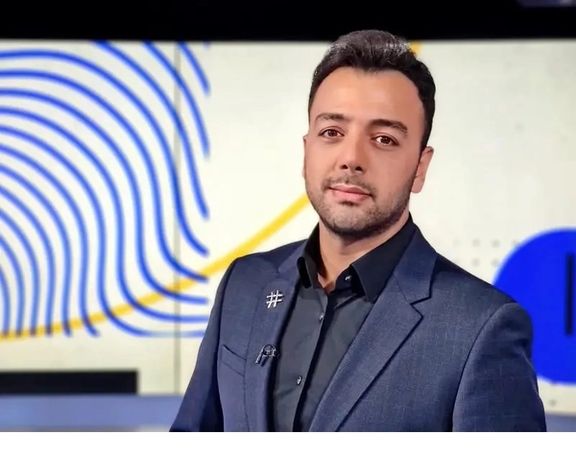
Weeks after Iran International TV host Pouria Zeraati was stabbed in London, Reporters Without Borders (RSF) is urging the UK to step up its protection of Iranian journalists.
In its report released on Wednesday, RSF called on the government to take all necessary measures to ensure the safety of Iranian journalists who are targeted with a “chilling and far-reaching threat” from Iran.
The investigation into the attack on Zeraati is being headed by the Metropolitan Police's Counter Terrorism Command, due to previous threats towards Iran International’s journalists.
In its report, the press freedom watchdog documented a rise of transnational threats faced by Iranian journalists working and living in the UK.
While the report found that Iranian journalists working abroad often face intimidation or harassment, including in the US, France, Germany, Sweden, and the UK, London is considered a "hotspot" for such attacks – given the number of prominent Persian-language broadcasters in the city.
The Iranian government has long threatened Iran International, with several journalists at the network facing imminent threats of attacks in the years 2022 and 2023.
The news network's offices were temporarily relocated from London to Washington last year after threats escalated to a level that domestic security services could no longer guarantee the safety of the staff.
According to the RSF report, almost 90% of Iranian journalists surveyed had experienced online threats or harassment in the past five years, including death and rape threats.
Families of journalists also routinely faced threats from Iranian authorities.
Approximately 60% of respondents in the report said that their families had been threatened, including being called in for interrogations, applying economic penalties, such as asset freezes or job losses, removing passports, travel bans, surveillance, tapping phone calls, and detentions.
The report also revealed that there are deficiencies in the support provided to journalists by law enforcement and social media platforms, partly because their plight is perceived as a “foreign priority, rather than domestic.”
The majority of journalists said they had negative experiences when they reported attacks to police, who did not understand the context or gravity of the threats they faced.
Only 13% of respondents reported abuse to the police over the past five years, with many considering it “a waste of time”.
Although online threats and harassment are high, journalists who report online abuse have overwhelmingly negative responses.
According to many respondents, complaints made to social media platforms were ignored or dealt with unsatisfactorily.
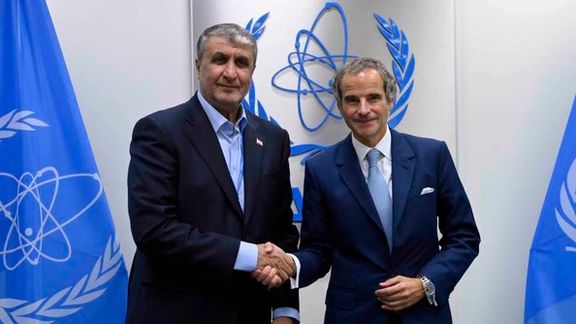
The head of Iran's Atomic Energy Organization, Mohammad Eslami, said on Wednesday that the International Atomic Energy Agency monitoring is in place and UN nuclear chief Rafael Grossi will soon visit Iran.
Mohammed Eslami did not specify a date for Grossi's visit in his comments. However, based on his previous remarks, the date might be as soon as early May. In February, Eslami announced that Grossi would attend the first international nuclear energy conference in Isfahan, coinciding with the 50th anniversary of establishing the Atomic Energy Organization of Iran.
However, Iran’s nuclear chief did not mention the closure of the nuclear facilities for 24 hours on Sunday in the wake of Iran's aerial bombardment which saw 350 plus missiles and drones launched towards Israel.
The IAEA director said on Monday that Iran closed its nuclear facilities on Sunday due to threats of an Israeli attack, fearing retaliation to the bombardment which saw forces from the UK, US, Jordan and France work to intercept the majority of the projectiles before they reached Israeli territory. While they reopened on Monday, Grossi said he would keep IAEA inspectors away until the situation calmed down.
As Israel considers whether to launch a counterattack, there has been speculation that some nuclear-related sites may be targeted. In response to a question regarding the possibility of Israel striking Iran's nuclear sites, Grossi replied on Monday, “We are always concerned about this possibility.”
Eslami also downplayed the tension by claiming that cameras are installed and "constantly monitor" the nuclear facilities and that inspectors also visit them regularly.
Iran said the attack on Saturday was an action of self-defense in retaliation for an alleged Israeli strike on its consulate in Damascus on April 1. It was the first direct action initiated inside Iran against Israel and began a new chapter in the conflict between the two countries previously engaged in a years-long shadow war.

Iranian President Ebrahim Raisi warned on Wednesday that any "tiniest invasion" by Israel would face "massive and harsh" response from Iran as the two archenemies sit on the verge of war.
His threats came during an annual army parade which had been moved from its usual venue, a highway in southern Tehran, to a barracks north of the capital. Iranian officials gave no reasons for the venue change, and unlike in past years, the event was not live on state television.
Speaking about the weekend air attack in which 350 plus drones and missiles were fired towards Israel a "limited action" and warned that in case of a more expansive assault "nothing will be left from the Zionist regime."
With the help from allies including the United States, the United Kingdom and Jordan, most of the deadly bombardment was intercepted.
The Saturday aerial assault was, Iran claims, in retaliation to an Israeli airstrike on April 1 that targeted the consulate of Iran in Syria, killing several of its staff from the Revolutionary Guards, including two generals.
Israel has not detailed its response to the Iranian attack immediately but has vowed action will be taken. Its allies called for restraint from all sides to avoid further escalation.






